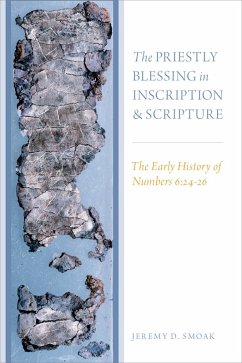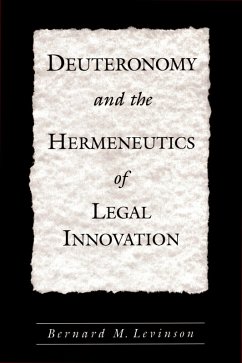
Sexual Pollution in the Hebrew Bible (eBook, PDF)
Versandkostenfrei!
Sofort per Download lieferbar
39,95 €
inkl. MwSt.
Weitere Ausgaben:

PAYBACK Punkte
20 °P sammeln!
The concepts of purity and pollution are fundamental to the worldview reflected in the Hebrew Bible, yet the ways biblical texts apply these concepts to sexual relationships remain largely overlooked. Sexual Pollution in the Hebrew Bible argues that, when applied to sexual relations, pollution language usually reflects a conception of women as sexual property susceptible to being "ruined" for particular men through contamination by others. In contrast, however, the Holiness legislation of the Pentateuch applies such language to men who engage in transgressive sexual relations, conveying the id...
The concepts of purity and pollution are fundamental to the worldview reflected in the Hebrew Bible, yet the ways biblical texts apply these concepts to sexual relationships remain largely overlooked. Sexual Pollution in the Hebrew Bible argues that, when applied to sexual relations, pollution language usually reflects a conception of women as sexual property susceptible to being "ruined" for particular men through contamination by others. In contrast, however, the Holiness legislation of the Pentateuch applies such language to men who engage in transgressive sexual relations, conveying the idea that male bodily purity is a prerequisite for individual and communal holiness. This understanding of sexual pollution, found in Leviticus 18, has a profound impact on later texts. In the book of Ezekiel, it contributes to a broader conception of pollution resulting from Israel's sins, which bring about the Babylonian exile. In the book of Ezra, it figures in a view of the Israelite community as a body of males contaminated by foreign women. Drawing on psychological and cross-cultural studies as well as philological and historical-critical analysis of biblical texts, Eve Feinstein's study illuminates the reasons why the idea of pollution adheres to particular domains of experience, including sex, death, and certain types of infirmity.
Dieser Download kann aus rechtlichen Gründen nur mit Rechnungsadresse in A, B, BG, CY, CZ, D, DK, EW, E, FIN, F, GR, HR, H, IRL, I, LT, L, LR, M, NL, PL, P, R, S, SLO, SK ausgeliefert werden.













